Serving 573 students in grades Kindergarten-8, Valley Academy ranks in the bottom 50% of all schools in Utah for overall test scores (math proficiency is bottom 50%, and reading proficiency is bottom 50%).
The percentage of students achieving proficiency in math is 26% (which is lower than the Utah state average of 39%). The percentage of students achieving proficiency in reading/language arts is 33% (which is lower than the Utah state average of 43%).
The student:teacher ratio of 16:1 is lower than the Utah state level of 21:1.
Minority enrollment is 28% of the student body (majority Hispanic), which is lower than the Utah state average of 29% (majority Hispanic).
Quick Stats (2025)
- School Type: Charter School
- Grades: Kindergarten-8
- Enrollment: 573 students
- Student:Teacher Ratio: 16:1
- Minority Enrollment: 28%
- Overall Testing Rank: Bottom 50% in UT
- Math Proficiency: 26% (Btm 50%)
- Reading Proficiency: 33% (Btm 50%)
- Science Proficiency: 38% (Btm 50%)
- Source: National Center for Education Statistics (NCES), UT Dept. of Education
Top Rankings
Valley Academy ranks among the top 20% of public schools in Utah for:
Category
Attribute
Student Attention
School Overview
Valley Academy's student population of 573 students has grown by 43% over five school years.
The teacher population of 36 teachers has grown by 80% over five school years.
School Type
Grades Offered
Grades Kindergarten-8
Total Students
573 students
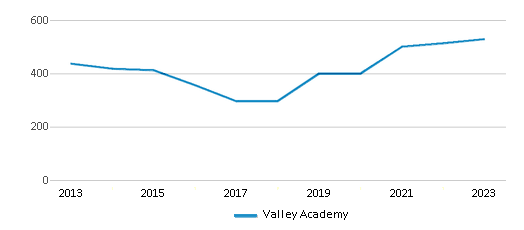
Gender %
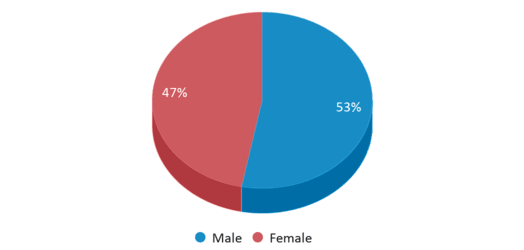
Total Classroom Teachers
36 teachers
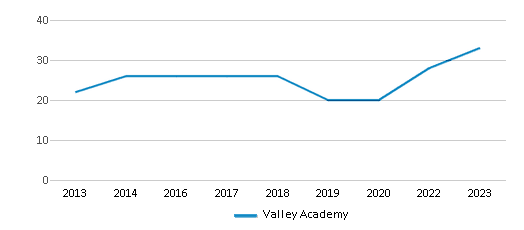
Students by Grade
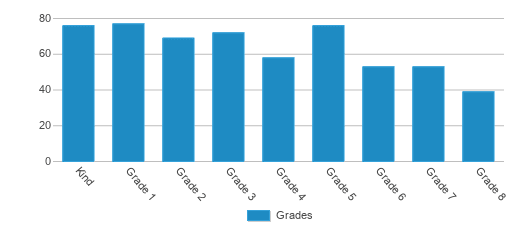
School Rankings
Valley Academy ranks within the bottom 50% of all 975 schools in Utah (based off of combined math and reading proficiency testing data).
The diversity score of Valley Academy is 0.43, which is less than the diversity score at state average of 0.46. The school's diversity has stayed relatively flat over five school years.
Overall Testing Rank
#750 out of 975 schools
(Bottom 50%)
(Bottom 50%)
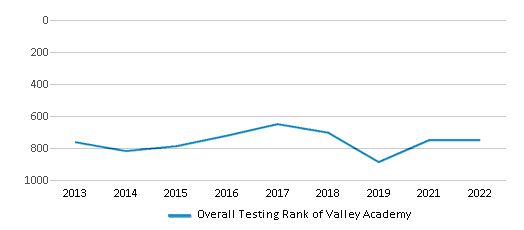
Math Test Scores (% Proficient)
(20-21)26%
39%
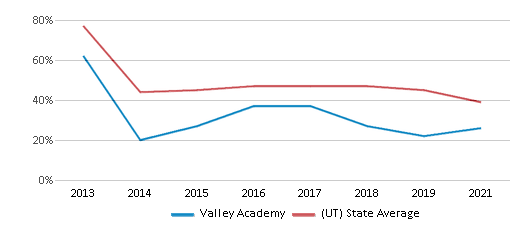
Reading/Language Arts Test Scores (% Proficient)
(20-21)33%
43%
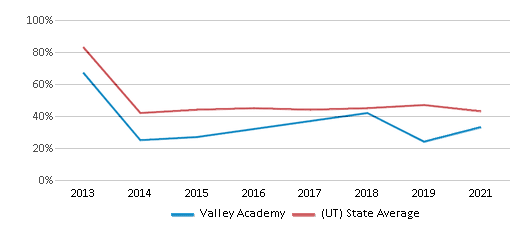
Science Test Scores (% Proficient)
(20-21)38%
45%
Student : Teacher Ratio
16:1
21:1
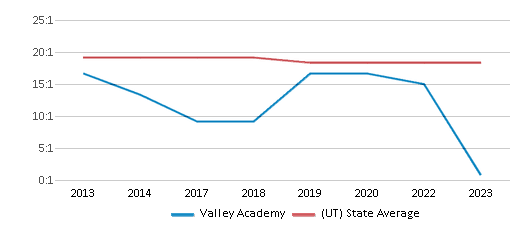
American Indian
1%
1%
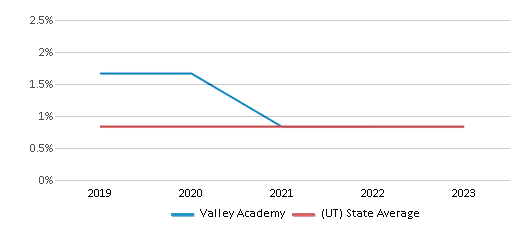
Asian
1%
2%
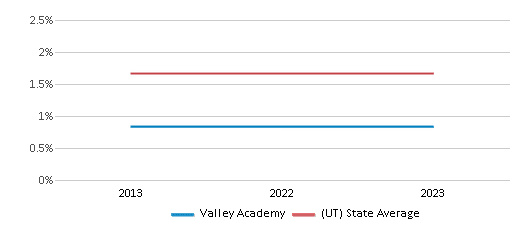
Hispanic
23%
20%
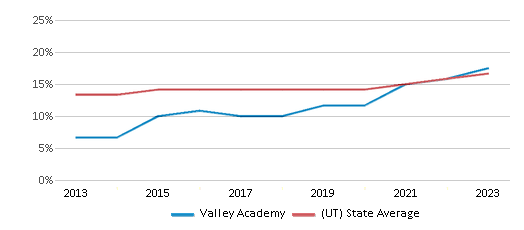
Black
n/a
1%
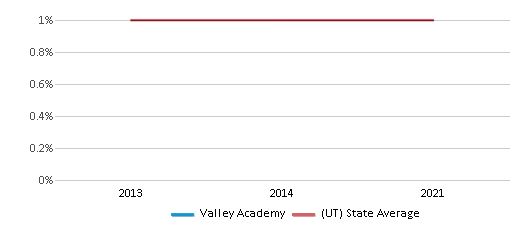
White
72%
71%
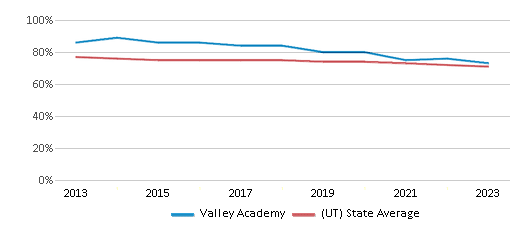
Hawaiian
n/a
1%
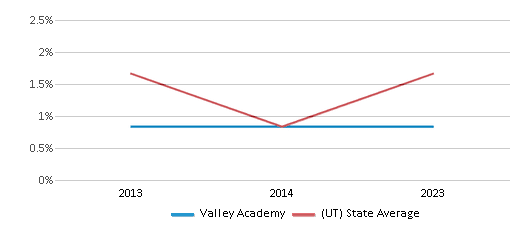
Two or more races
3%
4%
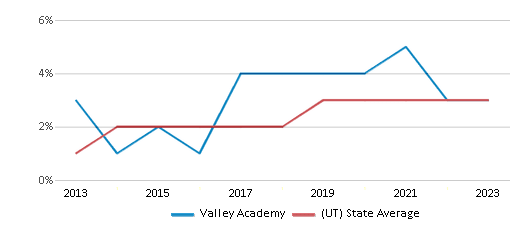
All Ethnic Groups
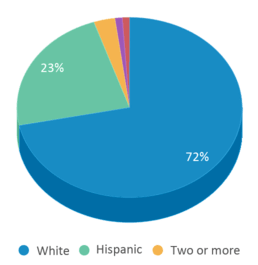
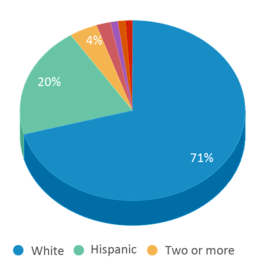
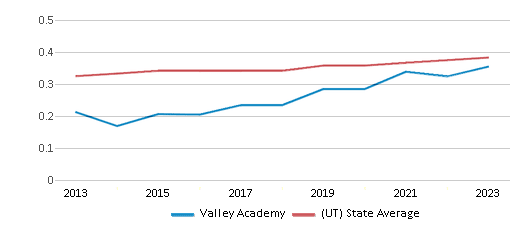
Eligible for Free Lunch
38%
24%
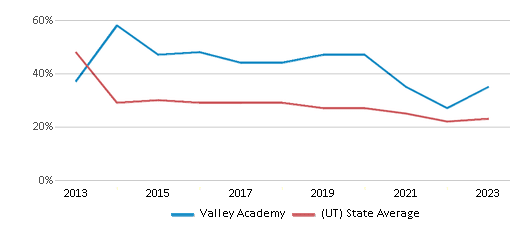
Eligible for Reduced Lunch
10%
6%
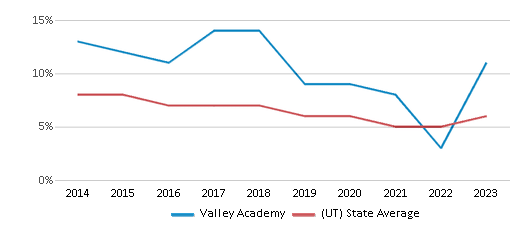
School Statewide Testing
School District Name
Sports
Total Sports Offered
4 sports
Sports
Dance, Freestyle Skiing, Mountain Biking, Snowboarding
Extracurriculars
Total ExtracurricularsTotal Extra-curric.
15 extracurriculars
ExtracurricularsExtra-curric.
Club or Organization:
Animal Science, Gardening, Mountain Biking, Robotics, Rocketry, Spanish, Website Design
Arts and Music Programs:
Ceramics, Dance, Guitar, Musical Theater, Orchestra, Piano, Ukulele, Visual Arts
Animal Science, Gardening, Mountain Biking, Robotics, Rocketry, Spanish, Website Design
Arts and Music Programs:
Ceramics, Dance, Guitar, Musical Theater, Orchestra, Piano, Ukulele, Visual Arts
Source: National Center for Education Statistics (NCES), UT Dept. of Education
Profile last updated: 02/09/2025
Frequently Asked Questions
What is Valley Academy's ranking?
Valley Academy is ranked #750 out of 975 schools, which ranks it among the bottom 50% of public schools in Utah.
What schools are Valley Academy often compared to?
Valley Academyis often viewed alongside schools like Vista School, George Washington Academy, Laverkin School by visitors of our site.
What percent of students have achieved state testing proficiency in math and reading?
26% of students have achieved math proficiency (compared to the 39% UT state average), while 33% of students have achieved reading proficiency (compared to the 43% UT state average).
How many students attend Valley Academy?
573 students attend Valley Academy.
What is the racial composition of the student body?
72% of Valley Academy students are White, 23% of students are Hispanic, 3% of students are Two or more races, 1% of students are American Indian, and 1% of students are Asian.
What is the student:teacher ratio of Valley Academy?
Valley Academy has a student ration of 16:1, which is lower than the Utah state average of 21:1.
What grades does Valley Academy offer ?
Valley Academy offers enrollment in grades Kindergarten-8
What school district is Valley Academy part of?
Valley Academy is part of Valley Academy School District.
School Reviews
5 12/15/2021
Our first grader started there this year. I have been pleased with his improvements and his teacher's love for her students. He is a child that some would say is difficult, their discipline techniques have been efficient and have helped him have more great days than not. Their school counselor uplifts and improves mental/emotional health in ways that are beautiful. The principal is very organized, has a long history of education, and again truly loves the students and the school's growth. He often sits in on many classes to make sure the students and teachers are moving along in a healthy fashion. I would recommend this school to anyone.
4 9/24/2020
This school has come a long way in the last couple of years. I heard they are now at their maximum capacity of 500 students under the new director. My children absolutely love it there!
Review Valley Academy. Reviews should be a few sentences in length. Please include any comments on:
- Quality of academic programs, teachers, and facilities
- Availability of music, art, sports and other extracurricular activities
Recent Articles

The Evolving Role of Interim Assessments
Explore the often-overlooked tool in K-12 education - interim assessments. Understand what they are, their importance, and how they can enhance your child's learning experience. Dive into real-world case studies and find out how technology is changing the game. This informative, parent-friendly article aims to shed light on the value of these assessments in today's educational landscape.
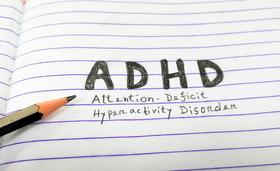
Understanding ADHD in Children: Signs, Diagnosis, and Support Strategies
We explores the complex nature of attention-deficit/hyperactivity disorder (ADHD) in children, providing insights into its symptoms, diagnosis process, and effective support strategies. From recognizing early signs to navigating the diagnostic journey, parents will gain valuable knowledge to help their child thrive. Expert insights, real-life examples, and practical tips empower readers to create a supportive environment that meets the unique needs of children with ADHD.

School-to-Prison Pipeline Persists Despite Local, State and National Efforts
Inadequate funding and resources for schools, harsh zero-tolerance discipline policies, police presence in public schools, and de facto segregation continue to create school environments in which poor and minority students have little chance of succeeding. The result is a continuation of the school-to-prison pipeline that has been commonplace in the American education system for decades, despite federal, state and local efforts to curb the problem.









